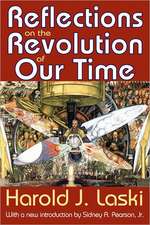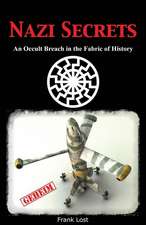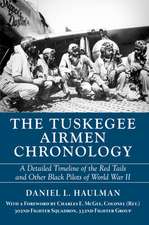Why Germany Nearly Won: A New History of the Second World War in Europe
Autor Steven D. Mercatanteen Limba Engleză Paperback – 9 iul 2014
| Toate formatele și edițiile | Preț | Express |
|---|---|---|
| Paperback (1) | 354.56 lei 6-8 săpt. | |
| Rowman & Littlefield Publishers, Inc. – 9 iul 2014 | 354.56 lei 6-8 săpt. | |
| Hardback (1) | 369.88 lei 6-8 săpt. | |
| Bloomsbury Publishing – 15 ian 2012 | 369.88 lei 6-8 săpt. |
Preț: 354.56 lei
Nou
Puncte Express: 532
Preț estimativ în valută:
67.85€ • 72.55$ • 56.57£
67.85€ • 72.55$ • 56.57£
Carte tipărită la comandă
Livrare economică 17 aprilie-01 mai
Preluare comenzi: 021 569.72.76
Specificații
ISBN-13: 9781442236868
ISBN-10: 1442236868
Pagini: 408
Dimensiuni: 153 x 232 x 26 mm
Greutate: 0.58 kg
Editura: Rowman & Littlefield Publishers, Inc.
ISBN-10: 1442236868
Pagini: 408
Dimensiuni: 153 x 232 x 26 mm
Greutate: 0.58 kg
Editura: Rowman & Littlefield Publishers, Inc.
Caracteristici
More than 30 charts, figures, and appendices, including detailed orders of battle, economic figures, and equipment comparisons
Notă biografică
Steven D. Mercatante is the founder and editor-in-chief of The Globe at War, a website focused on exploring World War II.
Cuprins
MapsTablesSeries ForewordPrefaceKey to Military SymbolsPart I1. The German War Machine on the Eve of War: Myth versus Reality2. The Third Reich Ascendant: The Reasons WhyPart II3. Comparing the World's First Military Superpowers on the Eve of War4. History's Bloodiest Conflict Begins5. An Inconvenient Decision Confronts Germany's Masters of War6. Another Roll of the Dice7. Stalingrad in Context8. The European War's Periphery9. Seizing the Initiative: The Sword versus the ShieldPart III10. A New Perspective for Explaining D-Day's Outcome11. Hitler's Greatest Defeat12. How the Third Reich Staved Off Total Defeat during the Summer of 194413. End GameNotesSelected BibliographyIndex
Recenzii
This is an intriguing book that will surely be of great interest to students of World War II. It offers a fresh analysis of why Germany was beaten and poses reasons why it should have won.
Offers a fresh perspective on key events like the D-Day landings . . . Mercatante's scholarship is undoubtedly on solid ground, which makes this book a welcome addition to Second World War bibliography.
Mercatante (independent scholar) challenges conventional wisdom about Allied success in Europe through an impressive operational overview of Operation Barbarossa and various battles on the Eastern Front, D-Day, and the final drive into Germany. . . . Recommended.
A thought-provoking book. . . . Mercatante's main purpose is to counter widespread arguments that brute force was the main reason for success in World War II. . . . The Germans, he argues, repeatedly demonstrated that qualitative advantages could be more important than quantitative superiority in men and materiel, and that the Allied armies eventually won because they became better at mobile and combined arms warfare than their enemies. . . . [Mercatante's] case deserves to be heard.
Even those familiar with World War II scholarship will find here analyses of economic and technological matters that historians have often glossed over or mentioned only in passing. . . .There is . . . much sound analysis scattered through this book.
Offers a fresh perspective on key events like the D-Day landings . . . Mercatante's scholarship is undoubtedly on solid ground, which makes this book a welcome addition to Second World War bibliography.
Mercatante (independent scholar) challenges conventional wisdom about Allied success in Europe through an impressive operational overview of Operation Barbarossa and various battles on the Eastern Front, D-Day, and the final drive into Germany. . . . Recommended.
A thought-provoking book. . . . Mercatante's main purpose is to counter widespread arguments that brute force was the main reason for success in World War II. . . . The Germans, he argues, repeatedly demonstrated that qualitative advantages could be more important than quantitative superiority in men and materiel, and that the Allied armies eventually won because they became better at mobile and combined arms warfare than their enemies. . . . [Mercatante's] case deserves to be heard.
Even those familiar with World War II scholarship will find here analyses of economic and technological matters that historians have often glossed over or mentioned only in passing. . . .There is . . . much sound analysis scattered through this book.



















